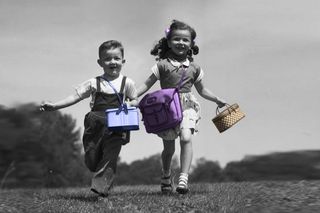
This Is What It Really Means to be Ready for School
Curiosity is as important as knowing your ABCs.

Kids are starting school all across the country right now, and many parents, whose kids are setting off for the first time, worry about kids’ school readiness. Efforts at preparing children for primary school are often focused on the ABCs and 123s — making sure kids are academically sharp. However, preparing children for primary school is not just about pouring knowledge into them. School readiness — the kind that sets kids up for long-term academic success — requires many soft skills, too.
Of the school readiness skills that set kids up for higher academic performance long term, social skills are among the most important. Skills like sharing, empathy, cooperation and making friends can actually be thought of as learning habits, because learning requires social interaction — with teachers, with peers and with administrators. These habits will pay off later: A 20-year-long study published in 2015 found that kindergarten kids who are socially adept and have strong social competence are more likely to attain higher levels of education and, in turn, get higher profile, better paid jobs. In contrast, kids with weaker social skills may struggle emotionally and socially throughout their adult lives.
Good communication skills will also help kids do well in school, so they can navigate the social interactions of a learning environment. Kids who can clearly voice what they want, need and feel at school will be able to access more knowledge. Research shows kids with a strong command over language are better equipped to pick up new topics and concepts. The ability to listen and communicate effectively comes in handy not just for academic learning, but for building strong social bonds and confidence in self-expression.
That confidence is built via independence — another important, if overlooked, skill that is critical to school readiness. It’s not a trait we tend to encourage in small children; parents often express their love by doing everything for their child. But independence — everything from the ability to feed one’s self to dressing one’s self to figuring out a new toy by trial and error — builds self-esteem and identity, which in turn will lead to problem solving and confident decision making not only in the classroom, but also later, in the workplace. What’s more self-efficacy and confidence has been linked to better grades and academic independence which leads to better control and achievement associated with reading and math.
Finally, a curious nature is another major asset for children preparing for primary school. Curiosity drives children to pick up new information, with long-term implications for learning: A recent study shows that the trait is associated with higher academic achievements in later years. “Curiosity is characterized by the joy of discovery and the desire for exploration and is characterized by the motivation to seek answers to the unknown,” explains lead author Dr. Prachi Shah, a researcher at the University of Michigan C.S. Mott Children’s Hospital and the Center for Human Growth and Development. She concludes that curiosity is the foundation of early learning, and can even be linked to math and academic achievement in later years.
While preparing children for primary school by equipping them with knowledge is important, many other skills play just as big a role in shaping kids’ learning curve and success into adulthood. With them, as well as the ABCs, kids have what they need to put their best foot forward toward academic success.
Related:
Angelina Shah is a staff writer with The Swaddle. In her previous life she was a copywriter in advertising. She has a penchant for reading, singing, travelling and being obsessed with superheroes.
Related


Unequal Housework Also a Top Source of Conflict in Indian Marriages
